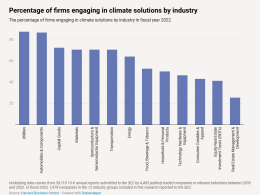The Deloitte CxO Sustainability Survey 2024 reveals that sustainability remains a top three priority for global management teams, ranking just behind innovation—such as advancements in artificial intelligence (AI)—and economic outlook concerns, and surpassing issues like political instability, regulatory pressure, and talent competition.
This emphasis on sustainability is underscored by the finding that 85% of surveyed executives report their organisations have increased investments in the green transition over the past year, up from 75% in 2023. Furthermore, half of respondents indicate they have begun leveraging technology to achieve climate goals, with another 42% planning to do so within the next two years.
The 2024 Deloitte CxO Sustainability Report is based on a survey of over 2,100 top executives from 27 countries across all continents, analysing evolving attitudes and actions related to climate change and sustainable business practices across various industries.
The rising impact of climate change on business strategies is apparent, with 70% of leaders—up from 61% last year—expecting significant climate-related consequences within the next three years. Nearly half (45%) are actively working to transform their business models for greater sustainability.
Key actions already implemented include the adoption of sustainable materials (51%), improvements in energy efficiency (49%), and the design of eco-friendly products and services (48%). Technological solutions are also being increasingly deployed or planned in areas like monitoring environmental, social, and governance (ESG) performance across supply chains (57%), enhancing operational efficiency (54%), tracking internal ESG performance (54%), developing sustainable products and services (52%), and improving reporting processes (52%).
Executives cite operating margins and supply chain resilience (37%) among the top five benefits of sustainability initiatives, along with meeting consumer (38%) and employee expectations (37%).
“A notable trend identified by the study is the growing belief among management teams that climate change action can also be a driver for innovation, including through the use of technology, and it becomes obvious that they can work together and reinforce each other. Organisations are beginning to link tangible financial benefits to sustainability initiatives, which, in this year’s edition of the report, outrank benefits related to brand and reputation for the first time, which is a proof of a new stage of maturity in the transition,” stated Alexandru Reff, Country Managing Partner, Deloitte Romania and Moldova.
The survey notes, however, that sustainability investments and progress vary widely. A majority of companies (56%) fall into a “moderate middle” category, pursuing sustainability with an eye on quick returns in key areas. Only 17% are “change leaders” with comprehensive, well-funded sustainability approaches, while over a quarter (27%) have made minimal or no progress in sustainable actions, despite 63% of them acknowledging that climate change impacts their operations and strategy.
“According to the strategic objectives assumed by the Paris Agreement and the Green Deal, there is a need to accelerate the real commitment to sustainability, materialised in high-impact actions such as the sustainable transformation of the business model or the implementation of robust ESG criteria along the value chains. In Romania, the transposition of the Corporate Sustainability Reporting Directive (CSRD) marks a new phase of the compliance effort: thousands of companies operating in our country are subject to mandatory non-financial reporting, which has its first deadlines in 2025, therefore the efficient education of stakeholders and the development of data collection and reporting capabilities are essential for the business environment,” stated Ovidiu Popescu, Partner, Deloitte Romania, Leader of the energy and sustainability practices.
Challenges facing companies in their sustainability transformations include the limited availability of sustainable materials (21%) and the pressure to focus resources on immediate challenges (18%), such as inflation, post-pandemic market effects, and geopolitical tensions.




















